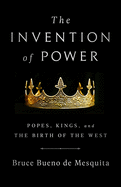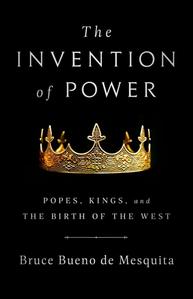
 It's doubtful that many people outside the field of medieval scholarship have even a passing acquaintance with the 12th-century agreement known as the Concordat of Worms. But readers of Bruce Bueno de Mesquita's thought-provoking and extensively researched The Invention of Power: Popes, Kings, and the Birth of the West will come away from it possessing not only a familiarity with that document and its historical context but also an appreciation of what, he argues, has been its profound influence on the politics and economic development of Western civilization.
It's doubtful that many people outside the field of medieval scholarship have even a passing acquaintance with the 12th-century agreement known as the Concordat of Worms. But readers of Bruce Bueno de Mesquita's thought-provoking and extensively researched The Invention of Power: Popes, Kings, and the Birth of the West will come away from it possessing not only a familiarity with that document and its historical context but also an appreciation of what, he argues, has been its profound influence on the politics and economic development of Western civilization.
As Bueno de Mesquita (The Spoils of War) explains, the agreement signed at Worms in 1122 by Holy Roman Emperor Henry V and Pope Calixtus II, along with two similar predecessor pacts from England and France in 1107, dealt on their face only with the selection of bishops and the allocation of resources in vacant dioceses. In fact, their reach was much more profound, as they established the "strategic triggers and competitive logic" for future contests between Europe's temporal and religious leaders. Those rules, he argues, tilted the playing field in favor of the former and laid the foundation for a "Western exceptionalism" ultimately rooted in regulated economic competition and accountable representative government, rather than in any claims of "superior culture, superior religious beliefs, or superior people," making Western Europe "so much richer and freer than most of the rest of the world."
Though Bueno de Mesquita, who teaches politics at New York University and concedes he is not a historian, doesn't entirely eschew traditional narrative, he draws more heavily on techniques rooted in game theory and quantitative analysis to make his central points and marshals an impressive body of evidence to support his thesis. Thus, his book features a substantial collection of charts and graphs, as he applies statistical methods to indicia of economic performance that include data like the location of European bishoprics in relation to trade routes and comparisons of per capita income in Western Europe relative to other regions of the world.
Bueno de Mesquita, who suggests that "the consequences of the logic put into motion at Worms is still at work in today's Europe," recognizes that much of the data he cites points to correlation rather than causation, and is suitably humble when he expresses the hope that his audience will be "persuaded, or at least intrigued," by his claims. But even those inclined to refute his argument will have to concede that he's made an intellectually stimulating case for the profound and enduring influence of a heretofore obscure series of historical events from 10 centuries ago. --Harvey Freedenberg, freelance reviewer
Shelf Talker: Bruce Bueno de Mesquita advances some provocative claims for the impact of the Concordat of Worms on the development of the West.

